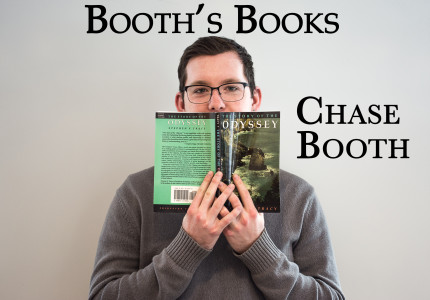Column by Chase Booth
boothcha@grinnell.edu

As a classics major myself, I suppose it’s apt that my final book review should be about Donna Tartt’s breakout novel, “The Secret History,” a story of death, beauty and psychological breakdown — with some classics majors thrown in. Many might recognize Tartt’s name from her more recent novel, “The Goldfinch,” which stole the top spot on the New York Times Bestseller list for weeks at the end of 2013. This novel, published in 1992, has the spectre of Greek tragedy looming all over it and will appeal to anyone whose sensibilities are primed for such dark and grim themes.
In the novel, Richard Papen reflects on his undergraduate education at an elite New England school with his secretive and cultic group of friends. He is a California boy wanting to escape his mess of a family and take refuge in the ivory tower of academia. At his new school of Hampden College in Vermont he fakes wealth, status and upbringing to fit in with the old money. After being inculcated into the secretive group of six classics students under the tutelage of a quirky professor, Richard soon discovers that he’s been caught up in a tragedy he won’t easily extricate himself from — the murder of one of his friends, Edmund “Bunny” Corcoran.
Yes, Tartt begins her tale with murder. We find out in the first sentence of the prologue of Bunny’s unfortunate demise with little more than the actual event to go off of. “The Secret History” inverts the classic detective story by telling the reader from the get-go someone has died and which character is responsible. The ensuing events are then not so much a whodunit but a whydunit. Why did Bunny die and what were the moments leading up to the event that ultimately decided his fate? This inversion allows Tartt to delve deeply into the psychological makeup of her characters, Zimbardo-prison-experiment style.
There is Francis, the sort-of closeted friend whose sprawling rural estate becomes a hideaway for the group. The twins, Charles and Camilla, whose parents died when they were young, and as a result, who fiercely rely on one another and share many of the same character traits. Camilla, as the only female in the hyper-masculine group, further attracts a lot of erotic attention throughout the novel. There is Bunny, the victim and pathological liar who knows exactly how to prey upon other people’s fears. And finally there is the enigma Henry, a quiet, fiercely intellectual person who maintains an aura of mystery and intrigue throughout the novel.
What brings this eclectic camaraderie together is their shared love of Ancient Greece, and it is this interest that ultimately spells their demise. Without giving away too much information, the friends attempt to replicate a pagan ritual that goes awry and puts them in dire straits. The majority of “The Secret History” deals with the fallout — the cover-ups, a clandestine trip to Rome and most seriously, the psychological damage incurred by the characters. Some develop alcoholism or other drug addictions. There are emotional breakdowns and severed ties of friendship. And our narrator, Richard, recalls all these events in unflinching but guilt-ridden prose which bridges the psychology of the text and our own emotional sensibilities as readers until we too are caught up in the events as they unfurl.
Tartt’s novel is obsessed with beauty, though not in the way one might think. “Beauty is terror,” she says, “Whatever we call beautiful, we quiver before it.” Richard, too, is obsessed with beauty: the ivory towers of an elite education, his rich friends, dead languages all are beautiful things to him, but these things ultimately catalyze the downfall of the friends. Tartt’s prose literally embodies this beauty and terror theme. It is smartly written with a delicate and lucid style that drew me into its wonderfully crafted writing but, though it was beautiful, its content was nothing but dark and tragic.
If you read “The Goldfinch” or Tartt’s other novel “The Little Friend” and enjoyed the harrowing themes of those books or if you’re intrigued by deep explorations into human psyche, you will definitely find those same elements in and enjoy “The Secret History.”



























































